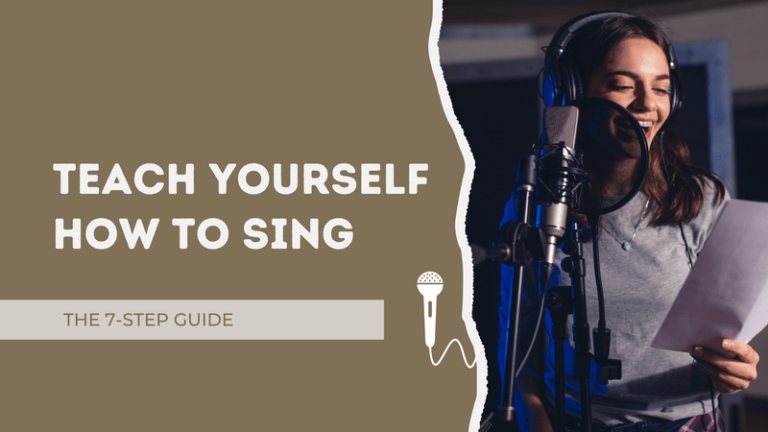100+ Vocal Training Tips: The Ultimate List
If you want to sing better, I will give you the most complete list of vocal tips right here.
I have listed 111 most effective vocal training tips that I have learned and used in my professional career.
And you can go through this list and choose the ones that work for you.
If you want to improve your singing, you have come to the right place.
If you’re ready, let’s dive into this.
Essential Vocal Preparation
Your body is THE instrument for singing.
It is very important that you prepare yourself physically and mentally for singing.
It makes all the difference in the quality of your practices and performances.

1. Listen to Your Favorite Singer
We’re all lazy, so get motivation from your favorite singer.
Use your earphones or play out loud and listen to their songs.
This helps to inspire you to overcome Resistance to practice.
2. Silence
People are busy and distracted.
It’s hard to get yourself in the right mind frame for practice when you’re thinking about 10 different things.
Design a short routine for 3-5 minutes for meditation, or just plain silence.
It should eliminate mental distractions and focus your mind for practice.

3. Go to an Isolated Space
Like reading, practicing for singing is an individual activity.
With people around, you’ll get really self-conscious and distracted.
If you’re at home, go to your room. Professional music practice rooms are the best..
You can even practice in the car.
4. Practice After 11 AM
The body does not fully “wake up” in the morning – at least for me.
It takes at least a full hour to fully warm up my voice in the morning.
It only takes 5 minutes to warm up my voice after about 11 am.
You can try different times to find out what’s best for you.
5. Get Shoulder and Back Massage
Obviously, when you’re alone, you can’t do this.
You need to get with a partner or ask someone to do you a favor.
These massages relieve unnecessary stress that would hinder your singing.

6. Release Neck and Throat Tension
Give the back of your neck a rub with your hand, particularly with your thumb.
And you can do the same to your throat area.
This is to relieve unnecessary neck and throat tension that causes the most vocal problems.
7. Stretch Your Body
Do some general body stretch to get the blood flowing in your body.
This is because we often feel sluggish before we start singing, especially in the morning.
Singing is a physical act, and even a sport. Do stretches to wake your body up for singing.
It will make your singing much easier with a body that’s warmed up.
8. Jumping Jacks
After you’ve stretched, you can do some jumping jacks to get the blood flowing even more.
Do at least 50 jumping jacks, but no more than 100.
The idea is to do just enough to get your body to optimal condition for singing without tiring you out.
9. Wait 1 Hour after meal
It’s hard to sing with a full stomach because you need to use abdominal muscles for singing.
Wait at least an hour for your body to digest after a meal.
You won’t feel as sluggish and sleepy as you usually do after eating.
10. Decide Goal for the Day
To practice more effectively, decide what you want to achieve before the practice.
It could be to hit a certain high note in full voice, learn the first verse of a song, etc.
Never practice on auto-pilot. You need to engage the mind.

20 Ways to Warm Up Your Voice
Much like a sport, it is very important to warm up the voice before you sing.
Even if you are in a rush, you can still do a quick one-minute warmup.
This is to optimize your voice before singing and reduce the risk of vocal injury.

11. Sing a song as soft as possible
Sing every note of a song as soft as possible.
Make sure you are using good technique while singing.
Singing softly will eliminate excess vocal tension while maintaining a focused tone.
12. Do Straw Exercises
Straw exercises are therapeutic and technically beneficial.
Put a straw in a cup with some water in it and phonate through it.
Test different water levels to see what feels good on your voice.
13. Light, but “Focused” Humming
Take a low breath and allow your stomach to puff out.
Apply downward pressure with your stomach while you hum any note.
Feel the buzz in the roof of the mouth and relax the neck muscles.
🎧Listen to it
14. Yawn from High to Low
Make a yawn sound from high pitch to low, much like what you do in a normal yawn.
Yawning opens up your throat in the most relaxing way, maximizing the resonance space without forcing it open.
🎧Listen to it

15. Vocal Fry to Get Blood Flowing
Vocal fry is the “bubbly” lazy sound we have when we wake up in the morning.
It can be used to get the blood flowing to the vocal folds.
Do a clean, “bubbly” vocal fry on an “AH” or a hum on any note.
Allow the vocal fry to happen instead of forcing it.
🎧Listen to it
16. Use “Unfinished” Sounds to Vocalize
The unfinished sounds include Humming, Z sound, V sound, Lip Bubbles, etc.
These are incomplete sounds that will regulate your airflow.
These are very safe exercises to optimize your voice for singing.
🎧Listen to it
17. Do a lot of Lip Bubble
Lip Bubble is probably the best warm-up exercise ever, in my opinion.
Without getting into vocal science, it is very therapeutic.
Not only is it great for warmup, it is also used for vocal recovery.
Without getting into vocal science, this exercise balances your vocal muscles to an optimal level for singing.
Listen to vocal coach Dr. Dan explain how he does lip bubbles:
18. Use Falsetto to Vocalize
Falsetto exercises are often overlooked in vocal training.
Falsetto training sets a great foundation for vocal development.
Make sure the falsetto sound is focused and NOT leaking air.
🎧Listen to it
19. Vocalize a wide vocal range
Doing exercises that cover at least one octave helps with vocal balance.
Vocalize at the same volume through the entire range.
This helps develop vocal control and eliminate unnecessary vocal tension.
🎧Listen to it
20. Cross Vocal Breaks
A vocal break is where you tend to crack, flip, or switch from full voice to falsetto.
Do vocal exercises that practice crossing those breaks smoothly.
When you can cross smoothly, that means you have eliminated excess tension.
🎧Listen to it
21. Vocalize in 5 Major Vowels
Every vowel requires a slightly different muscular coordination to produce.
Make sure you vocalize all 5 major Italian vowels – AH, EH, EE, OH, and OO.

22. Hold Single Notes Out
Do this warmup exercise with Lip Bubbles and Hums.
Pick any note and hold it out at a comfortable volume.
This exercise relaxes and balances your voice.
🎧Listen to it
23. Monitor Tongue Tension
Ideally, you want to lay the tongue flat, slightly touching the lower teeth.
This is good vocal practice to relax the tongue.

24. Lower Your Larynx
Warming up your voice with a lowered larynx helps eliminate vocal stress.
It feels like you are adding a yawn to your voice.
Do this on an octave AH or OO in a soft volume.

25. Warm Up for 10 Minutes Minimum
While singers do not always warm up, it is very essential vocal practice.
You are not just warming up vocal muscles, but also vocal techniques.
26. Hum in a Sneaky Way
While we are waiting to go on stage, do hums.
Hums cannot be heard easily in an open space.
Perfect for vocal warmup when you don’t have time.
27. Proper Support During Warmup
Treat your vocal warmup like real singing.
Push down or bear down slightly on the stomach while you vocalize.
This is proper support for great vocal production.

28. Find Good Vocal Placement – “The Buzz”
Find a buzz feeling at the roof of your mouth with a hum.
You might feel the buzz more in the nose.
Apply this buzz on EVERYTHING you sing from now on.

29. Breath Low
As you take a breath in, allow the stomach to puff out in a relaxed way.
Do not force the stomach out. Allow.
As you start singing, bear down on the stomach to support.

30. Do Not Skip Warmup
I’ll admit – I used to never warmup. Big mistake!
It’s like running sprints without stretching.
You need to warm up your voice. Really.
Even for a quick 3-min warmup, please do it.
Vocal Control and Coordination
Coordination training is using skills to optimize your current voice.
It’s kind of like shooting a basketball – you are training accuracy and efficiency.
You don’t necessarily need more muscles and strength.
You’re learning how to best use your voice.

31. Round Your Vowels
This is a vocal secret taught to me by vocal coach Dean Kaelin.
It naturally amplifies the voice without any extra effort.
Round your vowels by imitating the UH vowel on every vowel you sing.
🎧Listen to it
32. Sing High Notes in Mixed Voice
We all dread cracking those high notes.
You can sing the super high notes in mixed voice, which is basically stronger falsetto.
It is easier to control than full voice if you can’t quite hit those notes yet in full voice.
You should sing the high mixed voice with good technique – downward support and good placement (the buzz).
🎧Listen to it
33. Use Less Air
You don’t need that much air to sing well.
Apply downward support and vocal placement (buzz).
Try to eliminate “airyness” or husk for better control.
🎧Listen to it
34. Maintain Appropriate Vocal Tension
Apply a medium level of vocal fold closure.
Not too tight like a grunt and not too soft when it’s too airy.
This is efficient vocal production.

🎧Listen to it
35. Balance Airflow vs. Vocal Tension
Maintain consistent vocal quality when you vocalize.
Do not get louder or softer on certain notes.
Do not grunt or get airy on certain notes.
You should apply a moderate level of vocal tension while maintaining a smooth flow of air through the vocal cords.
36. Practice Messa Di Voce
This is a traditional Italian technique – singing smoothly from SOFT to LOUD, and back to SOFT.
Sing an AH or EH as SOFT as you can.
Gradually increase the volume to LOUD and back to SOFT.
It is actually very difficult to do, but do it slow as it will train your muscles for vocal control.
🎧Listen to it

37. Bridge Vocal Registers
Sing smoothly through different vocal registers at a medium volume.
Make sure you cover the low, middle, and high range of your voice.
🎧Listen to it
38. Strengthen Your Falsetto
Many singers do not know this, but falsetto training is extremely important.
Even if you don’t use falsetto, it is the foundation for full voice training.
If you have a good falsetto, full voice will become much easier to sing.
🎧Listen to it
39. Maintain Consistent Vowel
Just like consistent volume, keeping the same vowel through your range is important.
When an AH starts to sound like tight EH in the upper range, it’s a recipe for vocal stress.
When the vowel changes, the muscles will too (more tension).
🎧Listen to it
40. Practice Both Loud and Soft Volumes
Practice singing at different dynamics.
After singing at a soft volume, practice singing loud as well.
To be a good singer, you need to be able to sing both loud and soft.
🎧Listen to it

41. Practice Technique before Style
This is a common mistake singers make when they learn a song by imitating their favorite singers first.
Practice every note with good technique before you play with style and emotions.
42. Release Excess Vocal Tension While You Vocalize
The most effective way to relax the “wrong muscle” is to use proper technique.
Find the buzz at the roof of the mouth and apply downward abdominal support.
Do not push for volume and power while training for coordination.
Voice Building & Strength Training
Strength training is building muscles for singing.
It’s like bodybuilding or weight training for the voice.
You can literally build a stronger voice, hit higher notes, or sing louder.
We are isolating the vocal muscles and skillfully working them out.

43. Build Vocal Muscles for Singing
People with weak voices can literally build a voice from scratch.
You can strengthen your voice through Voice Building exercises.
It’s kind of like bodybuilders building muscles. There are exercises you can use to build your voice.
44. Sing Loud Volume without excess tension
These are mainly full voice exercises where you sing at a loud volume with good technique.
Remember – good technique means downward abdominal support and good placement (buzz).
45. Use “Stair Stepping” to Build High Notes
Let’s say, you keep cracking at a high A4 note in full voice during practice. You go “downstairs” to hit a G#4, G4, and to an F#4.
And then, you go upstairs again in half steps, so it look like this:
A4(Crack) ➡️ G#4 ➡️ G4 ➡️ F#4 ➡️ G4 ➡️ G#4 ➡️ A4
The idea is to keep attacking the highest note to build up the muscles.
This is done with good vocal technique, of course.
Remember – you want to build muscles, not tension.
Listen to how vocal coach Jaime Vendera explains this:
45. Build a Powerful Full Voice Range
Contrary to popular belief, you can train your voice to sing higher in full voice.
Meaning, you don’t have to switch to falsetto.
With good vocal strength training, you can sing much higher than you think you could.
I will be sharing full voice exercises that build high notes.
So, let’s keep reading.
46. Hold a Note for as long as possible
This is one of the best ways for building vocal muscles.
Sing a siren on any vowel and hold the top notes for as long as possible.
You can even do this to strengthen the lower notes.
The key is to use good technique, kind of like lifting weights with good forms.
If not, you will strengthen the wrong muscles.
47. Extend Your Low Notes
Do a reverse siren to strengthen the low notes in good technique.
You need to push down on the stomach and feel the buzz in the roof of the mouth.
The low notes will be more focused and loud as you train them.
🎧Listen to it
48. Strengthen Every Note in Your Vocal Range
There is a different set of muscle configuration and coordination for every note in your range.
You should strengthen every note in the low, middle, and high notes through the vocal strengthening exercises.
49. When there is vocal strain, sing soft.
Singers tend to strain when they are trying to sing loud or high.
When you notice strain, sing a little softer to relieve stress.
For practice, you can sing as soft as possible for a song with good support.
50. Don’t Rush Building High Notes
Build up your high notes with good technique with neck and throat muscles relaxed.
The only muscles we are working on are the vocal muscles.
The goal is to sing high notes without strain. You want beauty and power without excess vocal stress.
51. Shake Your Head from Side to Side
This is a unique vocal stress relief method developed by the great Jaime Vendera.
Shake your head from side to side as if you are saying NO.
You do this to eliminate neck strain while you sing.
Just to be clear, you do this and vocalize a note at the same time.
Listen to Jaime explain how to do this:
52. Do not blast more air for High Notes
Singing high notes takes a lot less air than you think.
If you blast too much air on a high note, you might blow your vocal cords out.
The way to do that is to apply downward support and focus the sound with a buzz at the roof of the mouth.
53. Use More Abdominal Support
You will need more abdominal support for strength training.
Bear down on the stomach while you sing.
This controls the airflow and takes the tension off your neck and throat.
You will feel the voice freed up and relaxed. It is the most efficient way for vocal production.
54. Always Sing with Focus
At a loud volume, you should maintain the buzzing feeling at the roof of the mouth.
Sometimes it goes away because of strain. You need to find it.
This is an old pre-Bel Canto technique re-discovered by vocal coach Jaime Vendera.
The BUZZ is a perfect indicator that you are in good vocal balance without excess strain.
55. Practice Every Notes as Perfect as Possible
You need to strive for perfection in practice for the sound you produce.
Meaning – proper abdominal support, no vocal strain, and good placement.
So when you go on stage, you can be as wild and free as you want to be as an artist.
56. Build Strength with Repetitive Octave Sirens
This exercise can be done in either falsetto, mixed, or full voice.
Sing any vowel on an octave siren repeatedly until you run out of breath.
This is like bench pressing for the vocal muscles. Great for building vocal muscles.
🎧Listen to it
57. Don’t Shy Away from High Notes
Even when you can’t quite hit a high note in full voice, sing it in falsetto or mixed voice.
With good technique, you can slowly add weight to the high note to get it closer to full voice.
58. Sing Songs for Your Training, Not Just Exercises
You need to apply what you do for vocal training in real singing.
The things that you practice also need to be tested while you sing real songs.
After all, the goal of vocal training is to sing songs, not exercises.
Maintaining Good Vocal Health
Your physical body IS the instrument for singing.
It is essential that you take care of your health as a singer.
You have to work to keep your voice in optimal condition.
Here are the best tips to maintain good vocal health.
Let’s take a look.

59. Keep Your Body Hydrated
This is so important because the vocal folds need to be lubricated with moisture.
It takes roughly an hour for the water you drink to get to the vocal folds.
So, drink water to keep your body hydrated before you sing. Not tea, coffee, or carbonated drinks, but AQUA!!!

60. No Alcohol before Performance
From my experience, refrain from drinking alcohol the night before you sing.
If you have a huge performance, you need to avoid alcohol starting at least a week prior.
You can drink when you don’t have to sing. But overall, alcohol and singing don’t go together.
61. Reduce Caffeine Intake
This one is overlooked since coffee is viewed as somewhat healthy.
However, coffee dehydrates your body and makes your throat dry.
It’s not as bad as alcohol and drugs, but I’d say one cup a day is MAX for performance day.
62. Avoid Spicy Food
Spicy food irritates the vocal folds and creates phlegm, which makes it harder to sing.
Like coffee, avoid spicy food on the day of performance.
63. Avoid Dairy Products
This is also another big one – dairy products.
Dairy products create major phlegm and make the throat feel sticky.
It doesn’t hurt the voice, but it is very annoying and distracting for singing.

64. Adequate Sleep
We might not get a lot of sleep with our busy lifestyles, but for the performance day, you need to sleep.
Your body is THE instrument.
Sleep energizes and conditions it for singing.

65. Daily Vocal Workout
We all know exercising is good for your physical health.
Vocal Exercising is also important to maintain vocal health.
The voice is produced by muscles, and those muscles need to be exercised.
If you don’t, your voice will get weaker as time passes.
66. No drugs
Period.
67. Avoid Smoking
This goes for second-hand smoke as well.
Smoking dries up the vocal cords and affects your lung capacity.
It is almost the worst thing you can do for your voice.

68. Avoid Vocal Surgery If Possible
Vocal surgery could be dangerous to the voice if not done properly. It is said that Julie Andrews lost her beautiful voice after a failed surgery.
The key is proper vocal production with good vocal technique.
If you develop vocal nodules or polyps, go to a voice specialist for rehab first before considering surgery.
69. Increase Vitamin C Intake While Sick
Singers dread getting sick and losing their voices.
Vitamin C is the #1 solution singers and coaches rely on to fight sickness.
When you feel under the weather, take at least 2000mg of vitamin C per day.

70. Exercise to Stay Physically Healthy
Singers need to stay physically healthy and somewhat fit.
It not only helps with singing, but the singer will also feel more confident.
The body is the instrument.
71. Avoid Yelling in a Loud Environment
When we are in a loud environment, we raise our voices without realizing it.
Avoid pushing your voice to be heard by people.
Yelling wears out the voice.

72. Speak at a Moderate Volume
The best volume for speaking is a medium volume, not too loud and not too soft.
As long as the voice is clean and focused, you’re good to go.
People will hear you.
73. Use Only Water When Singing
Drink only water when you are singing, preferably warm or hot water with a little steam.
Forget about coffee, coke, or anything else.
Only water.
74. Steam Your Throat
You can use a steamer in the room you’re in.
If you don’t have one, vocalize in a hot shower, or take a hot bath.
The idea is to steam your throat for hydration. Great for singing!

75. Skip Meal Before Performance
It’s not optimal to eat with a full stomach.
This is what I do – I skip the meal right before the performance, but I eat fully in the previous meal.
So the eating schedule looks like this:
Eat a full lunch, no dinner, do the performance, and then eat whatever right after.
76. Sing No More than 2 Hours Straight
2 hours is already pushing the limits of most singers.
If you are practicing diligently, which is good, do not go pass 2 hours.
It would be too heavy vocally for most singers, and you might lose your voice.
77. Enjoy Singing
Most people sing because they enjoy it. Keep enjoying it!
I say that because when singers strive for excellence, sometimes they lose the joy of singing.
When you enjoy singing, you usually will sing better.

78. Use Singing Technique for Speaking
This is a secret a lot of non-singers do not know – you can use singing techniques for speaking.
You will have an advantage in your school presentation or any type of public speaking.
You will give an impression of professionalism to your audience, client, or colleagues.

79. Find Ideal Range for Speaking
There is a sweet range for everyone to speak in. You need to find yours.
Some ladies might be speaking too much in the upper range, making the sound shrill.
Some men tend to speak too low and push on the vocal cords too much.
Try lowering or raising your pitch for speaking to find the most efficient and relaxed way to speak.
Choosing Teachers & Singing Methods
Choosing the right teacher and singing method is extremely important.
The fact is – there are very few voice teachers that are good.
You can’t see the instrument, which makes teaching difficult.
Here are the important tips for choosing the right teacher. Let’s dive in.

80. Listen to How the Teacher Sing
Choosing the right teacher is very important.
Listen to how they sound when they sing. Can the teacher sing? If not, you need to move on.
If the teacher CAN sing, you need to evaluate if they CAN teach. If you’re always confused about their instructions, move on.
81. Evaluate the Teacher’s Students
One great way to evaluate the teacher is by listening to several of their students.
You might notice a similar quality.
See if you like the products that the teacher is producing?
I once had a teacher whose students all cracked their voices in one joint concert. It happened in later concerts too.
That’s when I knew the teacher’s method was not working. I moved on to another teacher.
82. Ask the Teacher Technical Questions
If the teacher tends to dodge students’ questions, that is a sign that they don’t really have a solid teaching methodology.
Some voice teachers are really teachers. They are singers who are trying to make a living, and so they teach.
I know this is harsh, but students like you need to know that truth.

83. Avoid Teachers with Big Heads
Occasionally, you will find teachers who are cocky and put down other teachers.
You might not want to take lessons from them, because they are usually blinded by their own pride.
The best teachers I’ve met are mostly humble and caring to their students.
84. Choose Teachers who are Helpers
What I mean is vocal coaching is a helping profession.
The teacher is not the star. They should help students shine.
If they want to be stars themselves, they can’t be good teachers.
Their focus is not on you but on themselves.
85. Teachers who are Still Learning
The best teachers I’ve met are constantly learning. They’re not afraid to admit they are wrong on some things.
You want to take lessons from these teachers.
86. Teachers who are Passionate about Teaching
Teaching is different from singing and performing. Teaching is a whole different set of skills that someone needs to learn.
Learn from people who are real teachers, not just singers. You will notice the difference after some lessons from them.
87. Choose a Method that Make Singing Easy
There are so many different methods of singing that say different things.
They can be pretty confusing for the students. You need to find a method that make singing easy for you.
Does the method make high notes easier to sing? Are you still running out of breath?
These are questions you can ask to evaluate the singing method.
88. Try Different Singing Methods
You can try different singing methods and see what works for you.
Learn one method for 3-6 months. If you are not singing better by then, move on to another teacher and method.
89. Train Coordination and Strength
I recommend singing methods that build vocal muscles and strengthen the voice.
Some singing methods only work on muscle coordination, giving you tricks to make singing easier. But, it doesn’t grow the voice.
Look at NBA players. They can be very skilled in their moves and accurate in their shots, but they still work out their muscles to run faster and jump higher.
Skill does not replace strength and muscular development.
90. Don’t be Loyal to One Teacher
Loyalty means nothing if the teacher can’t teach and you are not singing better.
You might also love the teacher’s personality, but are you getting better as a singer?
91. Be Your Own Teacher!
Renowned vocal coach John Henny once said, “All learning is self-teaching.”
The teacher might be the one teaching you, but you need to develop your own artistry and opinion about how to sing.
That’s when a real singer and artist is born out of you.
Style Development & Performance Training
Having great technique is not enough.
The singer is also an artist.
Singers need to develop their own styles and learn how to be a performer.
Let’s take a look at how you can do that.

92. Listen to Singers from Different Styles and Genre
When it comes to style, you should listen to many singers.
Expand your horizon by appreciating different genres and styles, even if you don’t like some of them.
The idea is to learn from many singers and develop your own singing style.
93. Do Not Imitate
You can never sound exactly like another singer.
You can take bits and pieces of riffs, licks, sound qualities you like from those singers.
But in the end, you need to sound like YOU!

94. Take acting classes
Acting helps with your interpretation of songs so, so much.
When you sing, you are actually getting into character.
If you have a chance, take acting classes.

95. Recite Lyrics
This is something that most singers are too lazy to do, including me. But reciting lyrics instead of just singing them helps you own the song.
You want to know the song inside out to perform it. Reciting the lyrics is like knowing your lines in acting.
It makes a whole world of difference in your singing. Try it!
96. Seek Opportunities to Perform
You should find a stage where you can sing. That’s really what singing is about, right?
Whether it is at church worships, community choirs, wedding gigs, parties, or just making YouTube videos, put yourself out there and sing!
You’ll be amazed at how much you will grow as a singer!
97. Embrace Stage Fright
Stage Fright is good. Seriously!
Stage Fright makes you do better.
You get butterflies in your stomach because all the blood is flowing to your brain to make you focus on what you have to do.
If you don’t get nervous, that means you don’t care.

98. Observe Your Audience From the Stage
Be aware of your audience’s reaction when you’re on stage.
Sometimes a little humor in between songs can be a hook to grab their attention, or maybe adding unexpected riffs to your melody gives them some surprise.
If the audience is cold, you need to try different things to save the performance.
If the audience is engaged, you’ll have a much easier time on stage.
99. Know Your Songs before Getting on Stage
You need to really know your songs for your performance. That will help greatly with your confidence on stage.
Being on stage is already nerve-racking. You don’t need extra mental stress and stage fright because of inadequate preparation.
100. Be Prepared Technically
Another way to have more confidence on stage is to nail your techniques. That takes good training and hard work.
But, if you put in the work, you will get better.
When you know you are good for a fact, you will naturally have confidence on stage.
Recommended Reading:
Can I Really Improve, Or Are People Just Born Singers?
By Camille van Niekerk – Singer/Vocal Coach

101. Ignore the Negative Voice in Your Head
While you’re singing on stage, you will hear a negative voice in your head that creates doubts about your ability to nail that song.
Expect that voice, because it will always be there at times. Most importantly, ignore it.
Say to yourself “I can do it!” in your head.

102. Sing Challenging Songs
You want to sing difficult songs that challenge you as a singer. That’s how you get better.
Obviously, you don’t want to pick songs that are way beyond your singing ability, but just enough to keep you excited and engaged.
If you sing songs that are too easy, you will get bored.
103. Don’t be too Humble on Stage
Nobody wants to see a performer acting all humble on stage.
The audience wants to see a confident singer who is confident and believes in what they are doing.
People want to be inspired by the person on stage.
104. Don’t be Yourself, Be the Performer
Don’t be your normal daily self.
When you are on stage, you are playing a role – the Performer in you.
You shouldn’t be someone you’re not, but there IS a performer in you. Let the performer come out.
105. Love Your Audience
People are spending their precious time in the audience watching you.
Think about what they need and want, and serve them.
Treat them like friends and families, because a performance is somewhat intimate.
106. Be Personal on Stage
Share something personal on stage. It could be an experience you have or something that’s on your mind recently.
The audience will be curious about what you have to say.

107. Just do it!
When you are scared to sing or perform, just do it.
Ignore the fear or even shame. Just walk on stage and do it.
You will learn and grow just from the experience.
108. Be Dressed for Success
When you are struggling with confidence or stage fright, be dressed for success.
Put on the best-looking costume, make-ups, or hairstyle.
The mentality is this: Even if you don’t sing that well, at least you look good.
That certainly helps in a visual profession like singing and performing.

109. Enjoy the Performance
When you have fun on stage, people will notice and enjoy your performance as well.
That is because we are more authentic when we are having fun.
The audience will appreciate it when you are being honest and true.
110. Emphasize Your Strengths, Hide Your Weaknesses
If you have a great voice, but you suck at speaking, keep your talking in between songs at a minimum.
If you have beautiful high notes, you should use them a lot in your performance.
In a performance, do what sets you apart from others.
111. Don’t be too Perfect
Perfection is boring.
Strive for excellence because you can always go for more.
You can always learn and improve no matter how good you are.

So…Are These Tips Helpful for You?
What do you think about this very long list of vocal tips?
Did I miss anything?
Is there anything you think should be included or excluded?
Let me know what you think by leaving a comment below.











